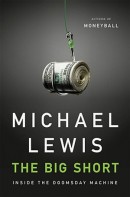 I feel like the blog is finally getting its 2011 legs. Or I hope so. This is supposed to be the biggest year in the site’s two-year history. (That’s what I read in Bloomberg Businessweek, anyway.) Time to pick up the pace.
I feel like the blog is finally getting its 2011 legs. Or I hope so. This is supposed to be the biggest year in the site’s two-year history. (That’s what I read in Bloomberg Businessweek, anyway.) Time to pick up the pace.
One thing I mean to do this year is write occasional updates of what I’ve been reading but don’t have the time (or inclination) to fully review. I’ve recently finished a few novels, but they were preceded by two books about the financial crisis.
I can’t believe I waited until it was in paperback to read The Big Short by Michael Lewis. I’ve been a big fan of Lewis’ ever since I read Trail Fever (now called Losers
), his chronicle of marginal figures in the 1996 presidential race. In The Big Short, he follows a few key players who fully foresaw the subprime mortgage crisis. He allows you to understand real-life complexities while crafting a narrative that is much neater and more satisfying than real life could possibly be, the way he’s done several times before. I’m not sure anyone is better at what they do than Michael Lewis is at what he does.
I’ve heard some readers were put off by the book’s characters because they were betting against the market. I find this a bit bizarre, since betting against the market — especially on this scale — comes with its own considerable risks (“For the pleasure of shorting 100 million dollars’ worth of New Century’s shares, Steve Eisman forked out $32 million a year.”), and it wouldn’t have been as lucrative a bet if any number of entities — bankers, the SEC, and most egregiously, ratings agencies — were just a bit skeptical.
Eisman, the most outspokenly skeptical of Lewis’ bunch, is a great character:
Once, [Eisman] got himself invited to a meeting with the CEO of Bank of America, Ken Lewis. “I was sitting there listening to him. I had an epiphany. I said to myself, ‘Oh, my God, he’s dumb!’ A lightbulb went off. The guy running one of the biggest banks in the world is dumb!”
Lewis made finance so accessible — and the story is so incredible — that I felt an urge to continue on the subject, and picked up John Lanchester’s I.O.U.: Why Everyone Owes Everyone and No One Can Pay. Lanchester (the author of The Debt to Pleasure
, a novel I read a long time ago and enjoyed) isn’t trying a magic trick on quite Lewis’ level. He’s content to offer a broader take on the banking basics — “piggy banks” (or traditional banks) vs. “casinos” (investment banks), etc. — and some of the most troubling trends of the past quarter century, including the disastrous sundering of the connection between borrowers and lenders. The book really picks up about a third of the way through, when Lanchester begins a sustained argument. He writes, “The credit crunch was based on a climate (the post-Cold War victory party of free-market capitalism), a problem (the subprime mortgages), a mistake (the mathematical models of risk), and a failure (that of the regulators).”
Like Lewis, he’s often funny and incisive at the same time: “The fact that noneconomists see the general assumption of rationality as self-evidently ridiculous has no effect on economists.”
Both books benefit from a tone that suggests the authors weren’t simply saving up ammunition for the day capitalism faltered, to claim it had expired. You don’t get the feeling that Lewis or Lanchester is walking around in a Che Guevara T-shirt, which gives even more weight to their assessment of the market’s insanity and continuing dangers, the way it’s come unmoored from its most basic principles and doesn’t seem much interested in (or capable of) returning to them.

